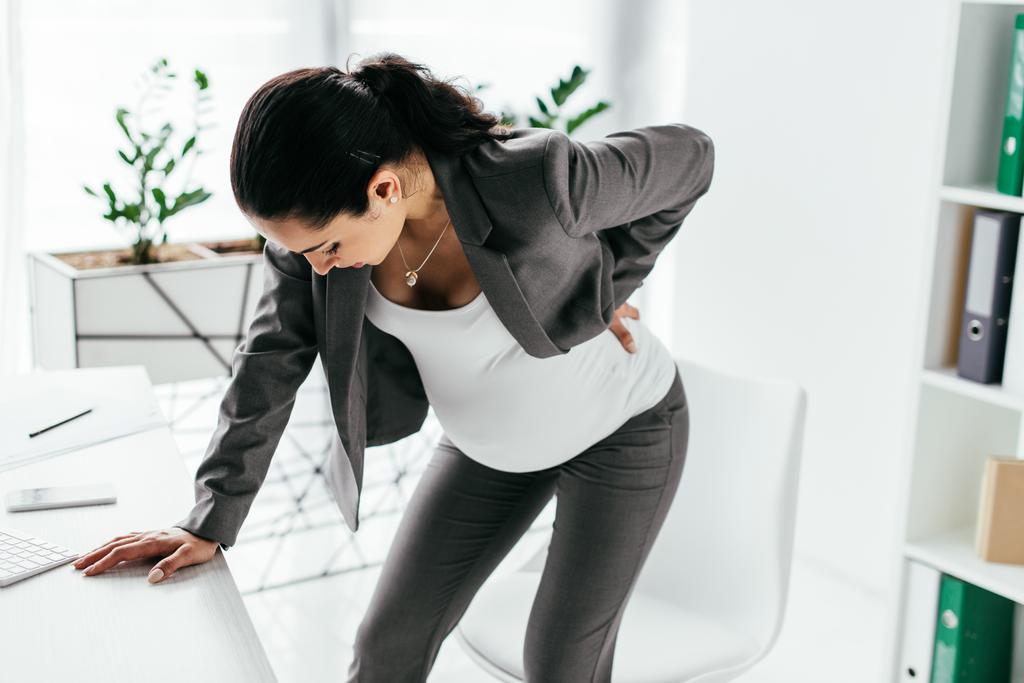Discover the impact of slouching and leaning forward on back pain during pregnancy.
Does Slouching or Leaning Forward Contribute to Back Pain During Pregnancy?
During pregnancy, many women experience back pain. It’s an unfortunate side effect of the miracle of life. But did you know that how you sit or even how you lean forward can make a difference? In this article, we will explore the connection between slouching, leaning forward, and back pain during pregnancy. So let’s dive in!

Understanding Back Pain During Pregnancy
Before we get into the nitty-gritty of slouching and leaning forward, let’s first understand why back pain is so common during pregnancy. There are a few factors at play here.
During pregnancy, a woman’s body goes through numerous changes to accommodate the growing baby. These changes can often lead to discomfort and pain, particularly in the back. Understanding the causes of back pain during pregnancy can help expectant mothers find relief and take proactive measures to minimize discomfort.
Causes of Back Pain in Pregnant Women
Several factors contribute to back pain during pregnancy. The growing baby bump shifts your center of gravity, putting more strain on your back. As the uterus expands, it pushes the spine forward, altering the natural alignment of the body. This change in posture can lead to muscle imbalances and increased pressure on the lower back.
Hormonal changes also play a role in back pain during pregnancy. The body produces a hormone called relaxin, which helps to loosen the ligaments in the pelvic area to prepare for childbirth. However, this hormone can also affect other ligaments in the body, including those in the back. The increased flexibility in the ligaments can lead to instability and a higher risk of injury.
Weight gain during pregnancy can also put additional pressure on your back. As the baby grows, so does the weight that the spine needs to support. This added weight can strain the muscles and joints, leading to discomfort and pain.
So, that extra scoop of ice cream might taste heavenly, but it won’t be doing your back any favors. Maintaining a healthy weight during pregnancy can help alleviate some of the stress on the back and reduce the risk of developing back pain.
The Impact of Pregnancy on Posture
Pregnancy does some funky things to your posture. As your belly expands, you might find yourself unintentionally slouching to compensate. The weight of the growing baby bump can pull the spine forward, causing the shoulders to round and the back to hunch. This altered posture can strain the muscles in the back and contribute to discomfort.
Additionally, your spine naturally curves more as your body prepares to accommodate the baby. The increased curvature, known as lordosis, can put additional stress on the lower back. This change in spinal alignment can lead to muscle imbalances and further exacerbate back pain.
But fear not! We’re here to shed some light on how slouching and leaning forward can contribute to back pain during pregnancy. By understanding the impact of posture and implementing strategies to maintain proper alignment, expectant mothers can reduce the risk of developing back pain and improve overall comfort during this transformative time.
The Connection Between Slouching and Back Pain
Slouching has become a modern-day epidemic, affecting people of all walks of life. But for pregnant women, slouching can exacerbate back pain. Let’s take a closer look at the science behind it.
The Science Behind Slouching and Back Pain
When you slouch, you increase the stress on your spinal discs and surrounding muscles. Imagine a tower of blocks. When the blocks are perfectly aligned, they can bear weight without any issues. But if you start to tilt the tower, the blocks become less stable and more prone to collapse.
Slouching works in a similar way. When you slouch, your spinal alignment is compromised, and the natural curvature of your spine is disrupted. This puts added stress on your lower back, which can lead to discomfort and pain. The muscles in your back have to work harder to support your body, and over time, this can lead to muscle imbalances and further contribute to back pain.
Furthermore, slouching can also affect the intervertebral discs in your spine. These discs act as shock absorbers between the vertebrae, allowing for smooth movement and preventing bone-on-bone contact. When you slouch, the discs are compressed unevenly, which can lead to degeneration and herniation.
Additionally, slouching can affect your posture and alignment beyond just your back. It can also impact your neck, shoulders, and hips. When you slouch, your head tends to jut forward, putting strain on the muscles and joints of your neck. This can lead to neck pain, headaches, and even contribute to the development of a condition called forward head posture. Slouching can also cause your shoulders to round forward, leading to tightness and discomfort in the chest and upper back. Your hips may also be affected, as slouching can contribute to an anterior pelvic tilt, which can lead to lower back pain and hip discomfort.
How Slouching Affects Pregnant Women
For pregnant women, slouching can intensify the back pain already experienced due to the changes happening in their bodies. The increased strain on the back muscles can become particularly bothersome during the second and third trimesters when the baby bump is at its largest.
During pregnancy, the body undergoes significant changes to accommodate the growing baby. Hormonal changes loosen the ligaments and joints in the body, including those in the spine. This can make pregnant women more susceptible to poor posture and slouching.
Slouching during pregnancy can not only exacerbate back pain but also contribute to other discomforts. As the baby grows, the center of gravity shifts forward, putting additional strain on the lower back. Slouching further adds to this strain, making it harder for the back muscles to support the weight of the baby bump.
Furthermore, slouching can also affect the alignment of the pelvis and the position of the baby. Poor posture can lead to a posterior pelvic tilt, which can make it more difficult for the baby to descend into the pelvis and assume an optimal position for birth. It can also contribute to a breech presentation, where the baby’s bottom or feet are positioned to be delivered first instead of the head.
So, it is crucial for pregnant women to make a conscious effort to sit up straight and maintain good posture throughout their pregnancy. This can help alleviate back pain, reduce discomfort, and promote optimal positioning of the baby for a smoother delivery.
Remember, sitting up straight doesn’t mean sitting rigidly or uncomfortably. It means finding a balance between maintaining the natural curves of your spine and feeling relaxed and supported. You can try using a cushion or a lumbar roll to support the natural curve of your lower back while sitting. Additionally, practicing gentle exercises and stretches specifically designed for pregnant women can also help improve posture and alleviate back pain.
By prioritizing good posture and avoiding slouching, pregnant women can not only reduce back pain but also create a healthier and more comfortable environment for themselves and their growing baby.
The Role of Leaning Forward in Back Pain
Now that we’ve covered slouching let’s talk about leaning forward. Though it may seem harmless, leaning forward can contribute to back pain during pregnancy. Grab a seat, and let’s lean into this topic!
Why Leaning Forward Might Cause Discomfort
Leaning forward can put added pressure on your lumbar spine, which is the area of your lower back that tends to bear the brunt of back pain during pregnancy. Whether you’re leaning forward to reach for something or bending down to tie your shoes, excessive forward bending can strain your back muscles.
Now, we’re not saying you need to avoid all forward bending. After all, life goes on even when you’re growing a tiny human inside you. But being mindful of your posture and using proper body mechanics can make a world of difference.
The Effects of Leaning Forward on the Pregnant Body
Leaning forward during pregnancy can also put pressure on your abdominal muscles, leading to more discomfort. As your baby grows, your abdominals stretch and weaken, making them more prone to strain. Leaning forward excessively can worsen this strain and contribute to overall back pain.
So, when you need to reach for that fallen pen or pick up your toddler’s toys, remember to engage your core muscles and use your legs to lift instead of relying on forward bending alone.
Preventing Back Pain During Pregnancy
Now that we’ve covered the connection between slouching, leaning forward, and back pain during pregnancy, let’s discuss some preventative measures. It’s time to take charge of your back health!
Importance of Good Posture
Maintaining good posture is key to preventing and alleviating back pain during pregnancy. Focus on sitting up straight, aligning your head, shoulders, and hips. This not only takes pressure off your back but also allows for better circulation and optimal fetal positioning.
Consider investing in a supportive chair or using a cushion to help maintain proper alignment, or try sitting on a yoga ball to engage your core muscles and promote better posture.
Safe Exercises for Pregnant Women
Regular exercise during pregnancy can work wonders for your back pain. Low-impact activities like swimming, prenatal yoga, and walking can help strengthen your core and back muscles, reducing the strain on your spine.
Always consult with your healthcare provider before starting an exercise routine and remember to listen to your body. If something doesn’t feel right, modify or stop the exercise. Pregnancy is not a time to push through pain.
Medical Interventions for Back Pain
In some cases, back pain during pregnancy may require medical intervention. Here’s when it’s time to seek professional help.

When to Seek Medical Help
If your back pain becomes severe, is accompanied by other worrisome symptoms like fever or vaginal bleeding, or if it affects your ability to perform daily activities, it’s time to reach out to your healthcare provider.
They can evaluate your condition, rule out any underlying issues, and recommend appropriate treatment options.
Treatment Options for Pregnancy-Related Back Pain
Your healthcare provider may recommend various treatments to manage pregnancy-related back pain. These can include physical therapy, chiropractic care, prenatal massage, or the occasional use of pain relievers if deemed safe for you and your baby.
Remember, the goal is to find relief while keeping both you and your little one safe and healthy.
So, does slouching or leaning forward contribute to back pain during pregnancy? The answer is a resounding YES. But now armed with this knowledge, you can take steps to improve your posture, minimize excessive leaning, and prevent and manage back pain throughout your pregnancy journey. Your back will thank you for it, and you’ll be able to focus on the joy and excitement of growing a tiny human inside you!



